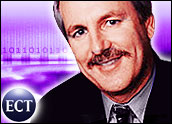
I’ve been talking about heroes for several weeks now, most recently the folks at HP who are overcoming the company’s internal bureaucracy to turn what had been a problem unit — its PC unit — into the most powerful PC entity in the world.
But inside HP another group of unsung heroes are those that are transforming their aging IT shop into a cutting-edge showcase of technology, which is making the corporation more agile.
In a broad sense, these are the heroes that Microsoft is focused on in its “Heroes Happen Here” launch of Windows Server 2008, though not just for HP, for the world.
I actually think this is could turn out to be one of the most significant events this decade if others pick up on this and follow Microsoft’s lead to focus not on their products (lord I am getting sick of PowerPoint charts) or most vocal customers, but on their most successful customers. I think success, if nurtured, could create a technology-driven market recovery, and a better world, so let’s chat this week about that.
Rather than the product of the week I’ll close with Web sites focused on recognizing heroes.
How Heroes Get Lost
One thing I’ve noticed about folks who simply get things done is they don’t complain much. They tend to focus on getting around obstacles to complete tasks and problems are obstacles to be overcome or bypassed not things to discuss and whine about.
The end result is while they may initially log a complaint, they tend to quickly move on and the related vendor may not see them again and probably will never know of the solution that was eventually created.
However there are those, and this probably isn’t a surprise to anyone, that seem to relish in finding problems and who think perfection (as they define it) is the only way for a project to reach completion.
It is no surprise that these folks often run into “impossible barriers” and point to the vendor and/or related products as the problem. The vendor, because these folks are incredibly vocal, then focuses on fixing the perceived problems and the product moves sideways while the vendor wastes time fixing things that often aren’t really broken.
This frustrates everyone because the folks complaining will often never be happy, and the folks actually getting the job done aren’t even being heard, so they just see more problems they have to overcome.
The Difference Focusing on Heroes Could Make
By focusing on folks who are constantly finding reasons why things don’t work, there are no synergies created between groups who instead spend their time discussing why things can’t be done. By focusing on people who are overcoming obstacles, the focus shifts to actually getting things accomplished, and then to collecting and providing best practices.
These best practices then become the core of new product development, which is now shifted to pain points the heroes have that are probably much fewer and much more critical in nature. Their elimination is then seen as progress by the very people who are making the most progress with the product.
If I were to apply a runner analogy, this would be like shifting the focus of a coach from the runners who are running into lots of problems completing a race to those that are actually winning them. The result should be more wins and the message to those who are underperforming that if they want attention they need to focus on winning rather than finding ever more creative ways not to complete races.
How Hero Focus Could Spread
Every company has a mix of employees. There are those who overcome obstacles and those who seem to relish in finding them. There is actually a fun employee review I’ve used myself that uses the Superman Metaphor to measure employees. It identifies heroes as those who “can leap over tall buildings” and drops down to those that can’t recognize buildings in the first place. I know I have worked with both types.
On the job, these folks can actually take a lot of heat as their underperforming peers seek to slow them down to effectively bring down the curve and make it easier for everyone else. I can recall, personally, this starting way back in school where those that regularly got earned top grades, rather than being rewarded, were often derided and criticized.
Taking this back to the financial success HP is enjoying because Mark Hurd is enabling heroes in that company, companies like Microsoft and HP are large enough to lead by example. They can showcase the advantages of making heroes successful, and by setting this example drive other firms to emulate it.
The World Impact of Hero Focus
Back when I worked for a large company, I was one of those folks who constantly overcame difficulties and watched those that seemed to create them get the attention. Therefore, I’m particularly sensitive to this dynamic and feel the pain of those experiencing this today. During the ramp to the Iraq war I watched as normal people stood up trying to make things better and got pounded down with a result I think most of us would have liked to avoid.
If this concept spreads, I see a world where there are more people making real differences and fewer who are successful at stopping them. I think a world with more heroes would be a place I’d like to live.
Hero Web Sites
There are heroes in our lives right now that are generally not being remembered, recognized or rewarded. In thinking about this week’s column I ran into several sites that focus on correcting that problem.
The My Hero Web site tells stories of the kind of ordinary people who become the heroes that Tom Brokaw spoke about in his keynote. These are people who, through their actions and sacrifices make the world a better place. The site has an area where people can tell stories about the heroes in their lives, including animals who have behaved heroically.
While you might even recognize many of the names on the Top 150 heroes in technology, the fact is that we wouldn’t have a tech industry without them and it’s good to take a moment and remember that if it weren’t for these guys we’d all likely be still trying to write and do math longhand.
Heroes Among Us is an essay on how to recognize heroes we live with every day and gives advice on how to become one ourselves through our deeds.
On Workforce.com I discovered a story on how a CEO at KeySpan went to extreme measures to identify and reward the heroes in his company. I couldn’t help but think that the world would be better if more CEOs did this.
Finally, with major elections coming up, one site focuses on politicians who have gone out of their way to protect the rights and interests of their constituents.
Currently it is in the process of being populated and nominees vetted but it should be fully populated well before the general elections. This site is sponsored by the Society of Professional Journalists.
Rob Enderle is a TechNewsWorld columnist and the principal analyst for the Enderle Group, a consultancy that focuses on personal technology products and trends.






















































Rob, I appreciate this article. It speaks to some vital truthes. I think you agree that there is a time and reason to offer objective information (not the subjective, demeaning and pointless posts we all know of, including the authors of those posts) that may not be seen as positive at the moment, but which when considered seriously my provide something quite useful. I will be looking at all of the sites you linked. I AM , however, pleased that "The All-Time Top 150 i-Technology Heroes" lists some of my heroes who have also focused on achieving something of value (although they don’t work for and even come into direct conflict with a well known Fortune 1 company). I respect you even when I don’t agree with you, and I always respect your right to your beliefs, opinions, and information.
Thank you for writing this article. If technology becomes more important that people we may not be able to dig ourselves out. I hope others see the merit I do.